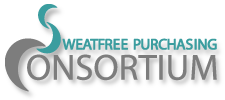What Members Say
Why are these government entities members of the Consortium?
City of Los Angeles, California
The City of Los Angeles has been an active supporter of the anti-sweatshop movement since the adoption of its sweat-free ordinance in 2004. However, joining the Sweat-Free Purchasing Consortium provided a great platform for systematic collaboration with like-minded entities. Our combined efforts will have a much greater impact in the fight to eliminate sweatshops globally.
—Department of General Services
City of Madison, Wisconsin
The City recognized that by collaborating with other public purchasing entities that share our goals, we can achieve greater impact through joint policy enforcement. Membership with the consortium will facilitate access to monitoring resources, factory information and policy implementation. Overall, it is really beneficial for us to be engaged with a strong network of agencies that can provide each other with guidance and feedback.
—Monette McGuire, Purchasing Services
City of Milwaukee, Wisconsin
The City of Milwaukee has found the Sweatfree Purchasing Consortium to be a good tool for raising awareness of the need for improving workplace environments and wages in the worldwide textile industry. The shared learning of the membership, and available tools, have both been valuable resources that assist with improving existing processes to meet common interests and goals.
—Rhonda Kelsey and Cynthia Matz, Procurement Services
State of New York
Membership in the Sweatfree Purchasing Consortium allows for the exchange of ideas with other governmental entities with the goal of achieving sweatfree purchasing. New York is pleased to take a leadership role in this vital endeavor to eliminate sweatshops.
—Michele Reale, Office of General Services
City of Portland, Oregon
The Consortium is a valuable professional network that helps the City promote fair and safe labor conditions in the garment manufacturing industry. By sharing knowledge and resources at the Consortium level, the City can be more efficient in meeting its Sweatshop Free Procurement directives.
—Christine Moody, Procurement Services
City and County of San Francisco, California
The Sweatfree Purchasing Consortium is key to the City of San Francisco's goal of ensuring that our textile and garment vendors and their suppliers use fair labor practices. We recognize that by pooling information and coordinating enforcement with other jurisdictions, we can have a much greater impact on the vendors and their suppliers than any single jurisdiction could have alone. We have already made use of the Consortium's database of vendors and suppliers, and we believe the joint purchasing power of the Consortium's members will help us achieve more transparency and a greater respect for labor law in the global textile industry.
—Donna Levitt, Office of Labor Standards Enforcement
